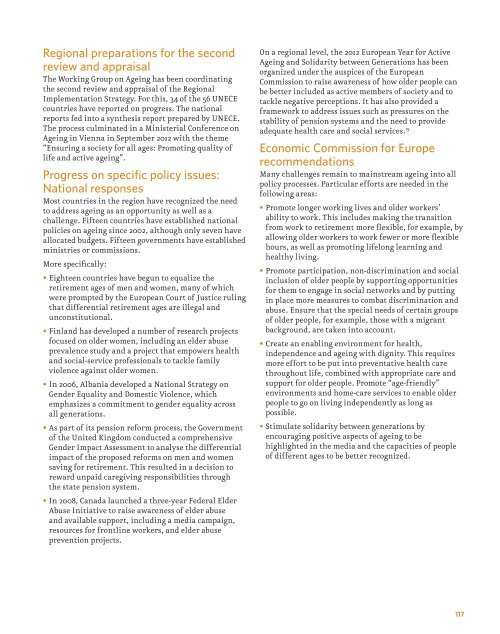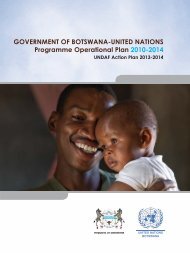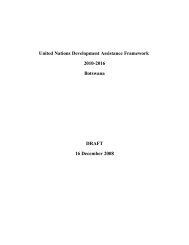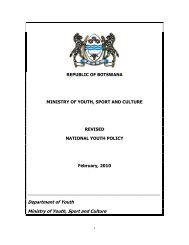Ageing in the Twenty-First Century: - HelpAge International
Ageing in the Twenty-First Century: - HelpAge International
Ageing in the Twenty-First Century: - HelpAge International
You also want an ePaper? Increase the reach of your titles
YUMPU automatically turns print PDFs into web optimized ePapers that Google loves.
Regional preparations for <strong>the</strong> second<br />
review and appraisal<br />
The Work<strong>in</strong>g Group on <strong>Age<strong>in</strong>g</strong> has been coord<strong>in</strong>at<strong>in</strong>g<br />
<strong>the</strong> second review and appraisal of <strong>the</strong> Regional<br />
Implementation Strategy. For this, 34 of <strong>the</strong> 56 UNECE<br />
countries have reported on progress. The national<br />
reports fed <strong>in</strong>to a syn<strong>the</strong>sis report prepared by UNECE.<br />
The process culm<strong>in</strong>ated <strong>in</strong> a M<strong>in</strong>isterial Conference on<br />
<strong>Age<strong>in</strong>g</strong> <strong>in</strong> Vienna <strong>in</strong> September 2012 with <strong>the</strong> <strong>the</strong>me<br />
“Ensur<strong>in</strong>g a society for all ages: Promot<strong>in</strong>g quality of<br />
life and active age<strong>in</strong>g”.<br />
Progress on specific policy issues:<br />
National responses<br />
Most countries <strong>in</strong> <strong>the</strong> region have recognized <strong>the</strong> need<br />
to address age<strong>in</strong>g as an opportunity as well as a<br />
challenge. Fifteen countries have established national<br />
policies on age<strong>in</strong>g s<strong>in</strong>ce 2002, although only seven have<br />
allocated budgets. Fifteen governments have established<br />
m<strong>in</strong>istries or commissions.<br />
More specifically:<br />
• Eighteen countries have begun to equalize <strong>the</strong><br />
retirement ages of men and women, many of which<br />
were prompted by <strong>the</strong> European Court of Justice rul<strong>in</strong>g<br />
that differential retirement ages are illegal and<br />
unconstitutional.<br />
• F<strong>in</strong>land has developed a number of research projects<br />
focused on older women, <strong>in</strong>clud<strong>in</strong>g an elder abuse<br />
prevalence study and a project that empowers health<br />
and social-service professionals to tackle family<br />
violence aga<strong>in</strong>st older women.<br />
• In 2006, Albania developed a National Strategy on<br />
Gender Equality and Domestic Violence, which<br />
emphasizes a commitment to gender equality across<br />
all generations.<br />
• As part of its pension reform process, <strong>the</strong> Government<br />
of <strong>the</strong> United K<strong>in</strong>gdom conducted a comprehensive<br />
Gender Impact Assessment to analyse <strong>the</strong> differential<br />
impact of <strong>the</strong> proposed reforms on men and women<br />
sav<strong>in</strong>g for retirement. This resulted <strong>in</strong> a decision to<br />
reward unpaid caregiv<strong>in</strong>g responsibilities through<br />
<strong>the</strong> state pension system.<br />
• In 2008, Canada launched a three-year Federal Elder<br />
Abuse Initiative to raise awareness of elder abuse<br />
and available support, <strong>in</strong>clud<strong>in</strong>g a media campaign,<br />
resources for frontl<strong>in</strong>e workers, and elder abuse<br />
prevention projects.<br />
On a regional level, <strong>the</strong> 2012 European Year for Active<br />
<strong>Age<strong>in</strong>g</strong> and Solidarity between Generations has been<br />
organized under <strong>the</strong> auspices of <strong>the</strong> European<br />
Commission to raise awareness of how older people can<br />
be better <strong>in</strong>cluded as active members of society and to<br />
tackle negative perceptions. It has also provided a<br />
framework to address issues such as pressures on <strong>the</strong><br />
stability of pension systems and <strong>the</strong> need to provide<br />
adequate health care and social services. 19<br />
Economic Commission for Europe<br />
recommendations<br />
Many challenges rema<strong>in</strong> to ma<strong>in</strong>stream age<strong>in</strong>g <strong>in</strong>to all<br />
policy processes. Particular efforts are needed <strong>in</strong> <strong>the</strong><br />
follow<strong>in</strong>g areas:<br />
• Promote longer work<strong>in</strong>g lives and older workers’<br />
ability to work. This <strong>in</strong>cludes mak<strong>in</strong>g <strong>the</strong> transition<br />
from work to retirement more flexible, for example, by<br />
allow<strong>in</strong>g older workers to work fewer or more flexible<br />
hours, as well as promot<strong>in</strong>g lifelong learn<strong>in</strong>g and<br />
healthy liv<strong>in</strong>g.<br />
• Promote participation, non-discrim<strong>in</strong>ation and social<br />
<strong>in</strong>clusion of older people by support<strong>in</strong>g opportunities<br />
for <strong>the</strong>m to engage <strong>in</strong> social networks and by putt<strong>in</strong>g<br />
<strong>in</strong> place more measures to combat discrim<strong>in</strong>ation and<br />
abuse. Ensure that <strong>the</strong> special needs of certa<strong>in</strong> groups<br />
of older people, for example, those with a migrant<br />
background, are taken <strong>in</strong>to account.<br />
• Create an enabl<strong>in</strong>g environment for health,<br />
<strong>in</strong>dependence and age<strong>in</strong>g with dignity. This requires<br />
more effort to be put <strong>in</strong>to preventative health care<br />
throughout life, comb<strong>in</strong>ed with appropriate care and<br />
support for older people. Promote “age-friendly”<br />
environments and home-care services to enable older<br />
people to go on liv<strong>in</strong>g <strong>in</strong>dependently as long as<br />
possible.<br />
• Stimulate solidarity between generations by<br />
encourag<strong>in</strong>g positive aspects of age<strong>in</strong>g to be<br />
highlighted <strong>in</strong> <strong>the</strong> media and <strong>the</strong> capacities of people<br />
of different ages to be better recognized.<br />
117







